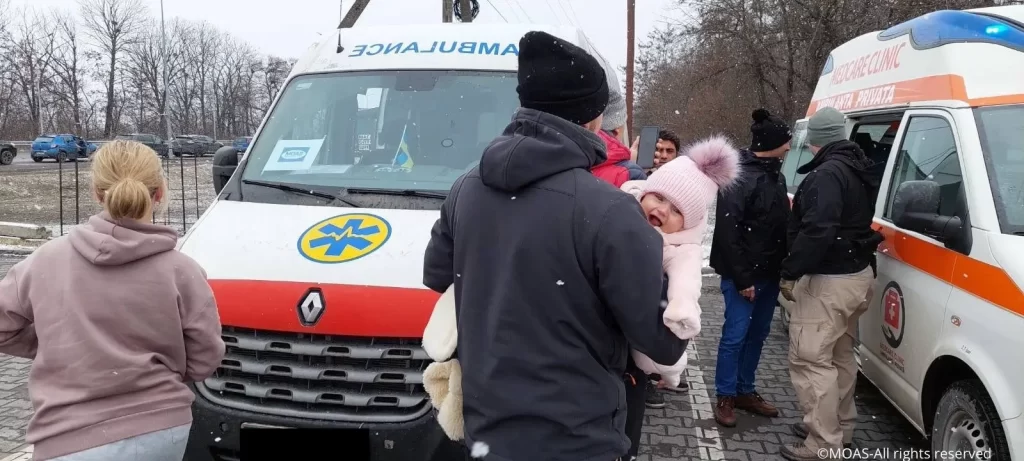The war in Ukraine has unleashed a devastating humanitarian crisis, ripping apart the lives of millions of families. From the horrors of displacement to the insidious erosion of normality of everyday life, the conflict has cast a long shadow on the very fabric of Ukrainian society.
The first impact, the most immediate one, was the mass displacement of a part of the population. Millions have fled their homes, seeking refuge in neighbouring countries or safer areas within Ukraine. This forced migration often severs families, with men staying in the country to fight while women and children embark on perilous journeys. After two years of conflict, over 10,000 Ukrainian civilians have been killed. 5 million Ukrainians are internally displaced and 6 million have fled across Europe. Today, more than one in three Ukrainians is displaced. Women and children, who comprise the vast majority of refugees fleeing the war, face heightened risks of gender-based violence and sexual exploitation. Many who try to return home face big challenges to rebuild their lives, finding their homes destroyed. The uncertainty of their futures and the emotional toll of separation leave deep scars.
Also, for those who remain in the country, life is very complicated. The war has plunged nearly a quarter of Ukraine’s population into poverty. Food insecurity is growing, affecting roughly one in five families. The closer families live to the fighting, the more severe the struggle to access, afford, and even prepare food becomes.
The war has left many Ukrainians living in damaged homes or barely winterised buildings, ill-equipped for the harsh realities of freezing temperatures. Particularly vulnerable are older adults and people with disabilities, who may be unable to escape these dangerous areas.
The conflict has also crippled Ukraine’s agricultural sector, with an estimated 6.5-8.5% of farmland lying. Landmines litter fields and agricultural machinery lies destroyed, forcing many small-scale farmers to abandon or significantly reduce their operations.
According to the WHO “1552 attacks on health, impacting health providers, supplies, facilities, warehouses and transport, including ambulances” have been documented, leaving families struggling to access essential healthcare. Also, schools have become targets: more than 3800 schools have been damaged or destroyed, leaving children without education. This lack of access to education threatens to undermine the future of a generation. The destruction of infrastructure disrupts access to basic necessities like water, electricity, and food, pushing families into precarious circumstances.
Phycological impact of conflict
The war’s psychological impact is profound. Children witness violence and experience unimaginable fear. The constant threat of shelling and air raids disrupts sleep, shatters their sense of security, and can lead to long-term anxiety and trauma. Parents grapple with the overwhelming task of keeping their families safe and providing a semblance of normalcy amidst the chaos.
For families who have lost loved ones in the conflict, the grief is inconsolable. The war has created a generation of orphans, leaving children to navigate the complexities of loss with limited support. The financial burden of caring for these children falls on extended families struggling to survive.
The war has also exacerbated existing inequalities. Women often become the sole caregivers for their children in the absence of their husbands. Additionally, families with disabled members struggle to access the care and support they require during displacement and amidst a strained healthcare system.
Resilience and hope
Despite the immense challenges, Ukrainian families demonstrate incredible resilience. They have formed support networks to provide for each other’s needs, with communities coming together to share resources and offer emotional support. The unwavering determination to rebuild their lives and reunite families fuels their strength.
This is what Nataliia, Vita, Inna, Oleksii, Myron, and everyone who joined the MOAS team in Ukraine did with great courage. Nataliia doesn’t get to see her child very often, her medical work at the frontline makes sure of that; Vita told to her husband that she would return home after 20 days and instead continue to be on the front line on the MOAS ambulances; Inna has momentarily stopped her project to start a family and left to save her fellow citizens. They are people who, from today to tomorrow, have lost the usual daily habits, to put themselves at the service of others and save lives, instead of remaining helpless in the face of war.
Final thoughts
The war in Ukraine is a stark reminder of the devastating impact of conflicts on families. By understanding their multifaceted challenges, the world can better support them in navigating the present crisis and rebuilding their shattered lives.

